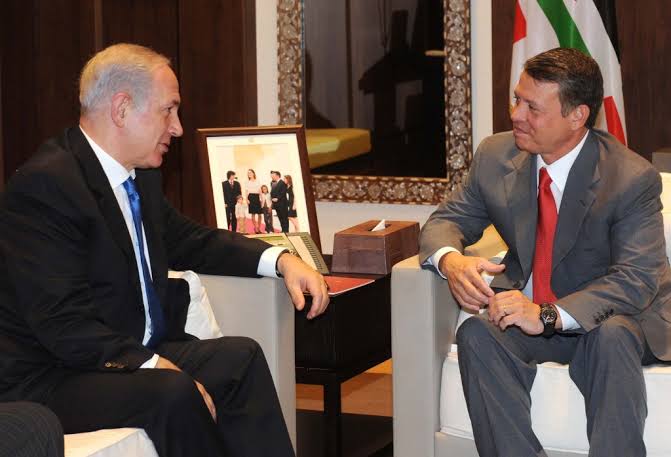In the midst of rising diplomatic tensions over the Al-Aqsa Mosque compound in occupied East Jerusalem, Jordan’s King Abdullah met with Israel’s Prime Minister Benjamin Netanyahu on Tuesday in Amman, according to a statement from Jordan’s Royal Hashemite Court.
An Israeli delegation and many Jordanian officials, including Deputy Prime Minister and Foreign Minister Ayman Safadi, were present at the meeting on Tuesday. After its representative Ghassan Majali was prevented on January 17 from entering the mosque, Amman had called the Israeli ambassador.
The extreme right-wing Israeli minister for national security Itamar Ben-Gvir stormed the mosque compound, the third holiest place in Islam, drawing condemnation from the Muslim world. This was followed by the Jordanian ambassador’s visit to the mosque. It was described as “an unparalleled provocation” by the Palestinians.
The sole organization in charge of overseeing sacred sites in Jerusalem, including Al-Aqsa Mosque, is the Jordan-run Jerusalem Waqf.
King Abdullah “emphasized the significance of respecting the historical and legal status quo in Al Aqsa Mosque/Al Haram Al Sharif,” according to the statement.
Right-wing Jewish groups have made several (many of them successful) attempts to enter the compound, posing a danger to the status quo there.
Jews are not allowed to pray there, but some far-right Israelis have been calling for a change in the religious status quo and want to be allowed to pray there.
As well as the Noble Sanctuary (al-Haram al-Sharif), known to Muslims as the site’s Dome of the Rock, Jews refer to it as the Temple Mount.
In order to open up a political horizon for the peace process, King Abdullah “emphasized the need to preserve calm and discontinue all acts of violence, calling for the end to any measures that could damage peace prospects,” the statement stated.
The monarch restated Jordan’s support for a two-state solution, which calls for the creation of a Palestinian state along the lines of June 4, 1967, with East Jerusalem serving as its capital, coexisting peacefully and securely with Israel.
In the 1967 Six-Day War, Israel took East Jerusalem and eventually annexed it; this action was not acknowledged by the majority of the international community.
Discussions also touched on the necessity for the Palestinian people to profit from regional and economic initiatives, according to the statement.
Since June 2018, Netanyahu has not been to Jordan or spoken with the monarch until now.
Additionally, this is Netanyahu’s first overseas excursion since re-election as prime minister in December.
The two leaders “addressed regional matters, including strategic, security, and economic cooperation between Israel and Jordan, which contributes to regional stability,” according to a statement from Netanyahu’s office.





